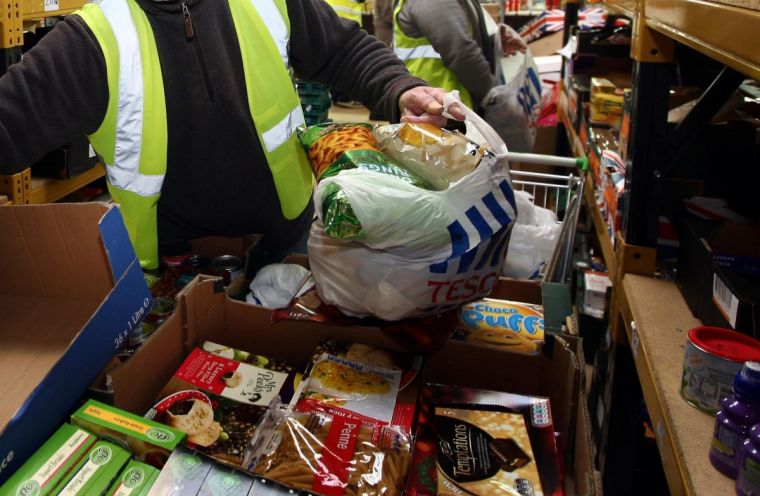Nearly a million need emergency food aid in Britain, but that's just 'tip of the iceberg'

The Trussell Trust has today released shocking new figures which confirm that the number of people facing food poverty in the UK has risen dramatically in the past twelve months.
The number of Brits receiving three days' emergency food from the charity's foodbanks jumped from 346,992 in 2012-13 to a staggering 913,138 in 2013-14 - a 163 per cent rise.
The North West has been revealed as the neediest region, with 138,644 people requiring the service in the past year, while the South-West follows closely with 105,521 foodbank visitors and 95,639 people received emergency food in London alone.
What's more, chairman of the Trussell Trust, Chris Mould, claims that this is just the "tip of the iceberg", noting that there are likely thousands more struggling people who are unaccounted for by these statistics.
"It doesn't include those helped by other emergency food providers, those living in towns where there is no foodbank, people who are too ashamed to seek help or the large number of people who are only just coping by eating less and buying cheap food," he says.
"In the last year we've seen things get worse, rather than better, for many people on low incomes. It's been extremely tough for a lot of people, with parents not eating properly in order to feed their children and more people than ever experiencing seemingly unfair and harsh benefits sanctions.
"Unless there is determined policy action to ensure that the benefits of national economic recovery reach people on low incomes we won't see life get better for the poorest anytime soon."
A survey also published this week undertaken by parenting website Netmums in partnership with the Trussell Trust further reveals the extent of food poverty in the UK. One in five working parents have had to choose between paying an essential bill and providing food for their family in the past year, while almost four in five have cut spending and 43 per cent admitted to "just about coping" with budgeting.
The latest information gathered suggests that wage freezes, the rising cost of food and soaring unemployment rates are to blame for this sharp increase in food poverty, and a shocking 83 per cent of foodbanks have reported increased demand due to welfare cuts and harsher benefit sanctions.
Upon visiting Gateshead foodbank, the Right Reverend Mark Bryant, Bishop of Jarrow, reported that a third of those requiring emergency food did so due to benefit delays.
"These are not people who are trying to work the system," he said. "These are people who are entitled to benefits, and the benefits system hasn't delivered on time.
"You go on visits like this and you hear the stories and you simply come away saying 'Something isn't right'. We have seriously got something wrong when people, who for a whole variety of reasons are very vulnerable, simply cannot afford either to feed themselves, or their families. When you look at that, you have to say 'This cannot be right, something is wrong'."
This data challenges former Tory MP Edwina Curry's comments that foodbanks are perpetuating demand, rather than helping to eradicate it.
"Free food subsidises low wages. It helps support the black economy. It pauperises those it seeks to help. Like giving money to 'homeless' beggars on London streets, it encourages more of what it seeks to relieve," she wrote in a blog for the Spectator in February, claiming that demand for food banks has risen simply because "if you increase the free supply of something worth having, you'll have takers queuing at the door".
Her reasoning was later criticised on the BBC's Daily Politics show by Vidhya Alakeson of the Resolution Foundation, however, who rebutted Currie with the argument that: "The majority of people who go to foodbanks would rather be paying money and going to a supermarket. Very few people love the culture of benefits and revel in the idea that they can go and get food for free."
In response to the escalation of food poverty, an End Hunger Fast campaign was launched earlier this year, during which supporters were encouraged to advocate on behalf of the needy, fast and call for urgent political action from the Government.
The campaign will culminate with a public vigil held outside Parliament in Westminster today, and a letter co-signed by 36 Anglican bishops and over 600 church leaders from every major denomination will be delivered to the constituency offices of David Cameron, Nick Clegg and Ed Miliband. According to the Trussell Trust, it is the "biggest ever faith leader intervention on UK food poverty in modern times", and the charity hopes that it will put pressure on political figures to act fast.
"That 900,000 people have received three days' food from a foodbank, close to triple the numbers helped last year, is shocking in 21st century Britain. But perhaps most worrying of all this figure is just the tip of the iceberg of UK food poverty," says Mould.
"A more thoughtful approach to the administration of the benefits regime and sanctions in particular, increasing the minimum wage, introducing the living wage and looking at other measures such as social tariffs for essentials like energy would help to address the problem of UK hunger."
The release of these latest figures follows the first call for evidence for the All Party Parliamentary Group inquiry into hunger and food poverty in the UK, which is being led by Labour MP Frank Field and the Bishop of Truro, Tim Thornton.











